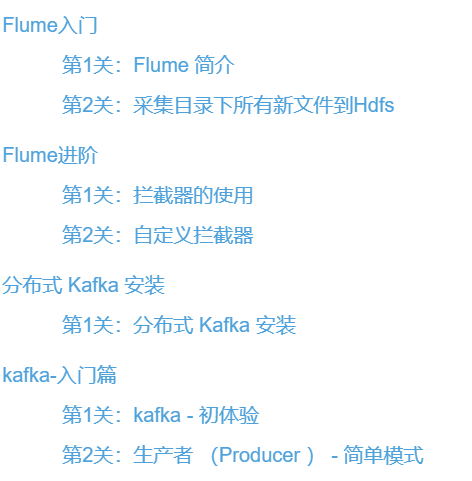
大数据处理技术-头歌平台-答案
写在最前HBase的安装与简单操作第一关:单机版安装第三关HBase 伪分布式环境搭建第一关:伪分布式环境搭建ZooKeeper入门-初体验第一关 ZooKeeper初体验第2关:ZooKeeper配置第3关:Client连接及状态ZooKeeper之分布式环境搭建第1关:仲裁模式与伪分布式环境搭建第2关:伪分布式体验及分布式安装配置Flume入门第1关:Flume 简介第2关:采集目录下所有新文
文章目录
写在最前
这里是大数据处理技术的实训作业 ,学校使用的是“头歌”平台。(我已经不想吐槽了)
开始的几章很简单,所以没有写
其中有几章题目,仅仅需要ctrl+c ctrl+v即可,只是操作步骤麻烦一下,所以也没有写。
HBase的安装与简单操作
第一关:单机版安装
mkdir /app
cd /opt
tar -zxvf hbase-2.1.1-bin.tar.gz -C /app
vim /app/hbase-2.1.1/conf/hbase-env.sh
# 在末尾添加 export JAVA_HOME=/usr/lib/jvm/jdk1.8.0_111
vim /app/hbase-2.1.1/conf/hbase-site.xml
替换原有的configuration标签
<configuration>
<property>
<name>hbase.rootdir</name>
<value>file:///root/data/hbase/data</value>
</property>
<property>
<name>hbase.zookeeper.property.dataDir</name>
<value>/root/data/hbase/zookeeper</value>
</property>
<property>
<name>hbase.unsafe.stream.capability.enforce</name>
<value>false</value>
</property>
</configuration>
vim /etc/profile
# 在末尾追加如下内容
#SET HBASE_enviroment
HBASE_HOME=/app/hbase-2.1.1
export PATH=$PATH:$HBASE_HOME/bin
source /etc/profile
第三关
put 'mytable','row1','data:1','zhangsan'
put 'mytable','row2','data:2','zhangsanfeng'
put 'mytable','row3','data:3','zhangwuji'
HBase 伪分布式环境搭建
第一关:伪分布式环境搭建
先按照 《HBase的安装与简单第一关配置好单机》,傻子平台。
vim /app/hbase-2.1.1/conf/hbase-site.xml
<!-- 替换configuration整体 -->
<configuration>
<property>
<name>hbase.rootdir</name>
<value>hdfs://localhost:9000/hbase</value>
</property>
<property>
<name>hbase.zookeeper.property.dataDir</name>
<value>/root/data/hbase/zookeeper</value>
</property>
<property>
<name>hbase.unsafe.stream.capability.enforce</name>
<value>true</value>
</property>
<property>
<name>hbase.cluster.distributed</name>
<value>true</value>
</property>
</configuration>
# 启动hadoop和hbase
start-all.sh
start-hbase.sh
# 查看进程
jps
# 在hdfs中验证
hadoop fs -ls /hbase
ZooKeeper入门-初体验
第一关 ZooKeeper初体验
tar -zxvf zookeepre-3.4.12.tar.gz /opt/zookeeper-3.4.12
cd /opt/zookeeper-3.4.12/conf
mv zoo_sample.cfg zoo.cfg
zkServer.sh start
# zkServer.sh stop
第2关:ZooKeeper配置
vim /opt/zookeeper-3.4.12/conf/zoo.cfg
把 “# maxClientCnxns=60 ”
改为
maxClientCnxns=100
第3关:Client连接及状态
zkServer.sh stop
vim /opt/zookeeper-3.4.12/conf/zoo.cfg
<!-- 修改为2182 -->
clientPort=2182
<!-- 添加preAllocSize=300 -->
preAllocSize=300
vim /opt/zookeeper-3.4.12/bin/zkEnv.sh
<!-- 修改第56行为 -->
ZOO_LOG_DIR="/opt/zookeeper-3.4.12"
zkServer.sh start
zkCli.sh -server 127.0.0.1:2182
ZooKeeper之分布式环境搭建
第1关:仲裁模式与伪分布式环境搭建
vim /opt/zookeeper-3.4.12/conf/zoo.cfg
修改默认。 修改zoo.cfg
这节有个智障操作,这里不吐槽了。按着步骤走吧。
<!-- zookeeper-3.4.12的zoo.cfg -->
<!-- 修改 -->
clientPort=2181
dataDir=/opt/zookeeper-3.4.12/tmp/data
<!-- 末尾追加 -->
server.1=127.0.0.1:2888:3888
server.2=127.0.0.1:2889:3889
server.3=127.0.0.1:2890:3890
第一个节点添加myid文件
mkdir -p /opt/zookeeper-3.4.12/tmp/data/
echo 1 > /opt/zookeeper-3.4.12/tmp/data/myid
cat /opt/zookeeper-3.4.12/tmp/data/myid
复制三个新节点出来
# 智障系统。您搁着我斗志斗勇呢呀
cp -r /opt/zookeeper-3.4.12/ /opt/zookeeper-3.4.12-01
cp -r /opt/zookeeper-3.4.12/ /opt/zookeeper-3.4.12-02
cp -r /opt/zookeeper-3.4.12/ /opt/zookeeper-3.4.12-03
第一个节点 修改zoo.cfg
vim /opt/zookeeper-3.4.12-01/conf/zoo.cfg
<!-- zookeeper-3.4.12-01的zoo.cfg -->
<!-- 仅修改这个就行 -->
dataDir=/opt/zookeeper-3.4.12-01/tmp/data
第二个节点 修改zoo.cfg
vim /opt/zookeeper-3.4.12-02/conf/zoo.cfg
<!-- zookeeper-3.4.12-02的zoo.cfg -->
<!-- 修改 -->
clientPort=2182
dataDir=/opt/zookeeper-3.4.12-02/tmp/data
第二个节点添加myid文件
echo 2 > /opt/zookeeper-3.4.12-02/tmp/data/myid
cat /opt/zookeeper-3.4.12-02/tmp/data/myid
第三个节点 修改zoo.cfg
vim /opt/zookeeper-3.4.12-03/conf/zoo.cfg
<!-- zookeeper-3.4.12-03的zoo.cfg -->
<!-- 修改 -->
clientPort=2183
dataDir=/opt/zookeeper-3.4.12-03/tmp/data
第三个节点添加myid文件
echo 3 > /opt/zookeeper-3.4.12-03/tmp/data/myid
cat /opt/zookeeper-3.4.12-03/tmp/data/myid
# 分别三个启动节点
/opt/zookeeper-3.4.12-01/bin/zkServer.sh start
/opt/zookeeper-3.4.12-02/bin/zkServer.sh start
/opt/zookeeper-3.4.12-03/bin/zkServer.sh start
第2关:伪分布式体验及分布式安装配置
智障平台,我重置了一次命令行,重新做了一遍才行。
zkCli.sh -server 127.0.0.1:2181,127.0.0.1:2182,127.0.0.1:2183
create /quorum_test "quorum_test"
quit
Flume入门
第1关:Flume 简介
第一题
Source Channel Sink
第二题
名称 类型 属性集
第三题
可靠性 可恢复性
第2关:采集目录下所有新文件到Hdfs
start-dfs.sh
hadoop dfs -mkdir /flume
我不得不吐槽一下这个平台。
你说你资源不够你做什么平台嘛。
也是,我理解,随时启动一个hadoop确实很耗费资源,但你不能在启动脚本中再启动一次hadoop吗? 你在这跟我捉迷藏呢?真就担心我找到你哈?
a1.sources = source1
a1.sinks = sink1
a1.channels = channel1
# 配置source组件
a1.sources.source1.type = spooldir
a1.sources.source1.spoolDir = /opt/flume/data
##定义文件上传完后的后缀,默认是.COMPLETED
a1.sources.source1.fileSuffix=.FINISHED
##默认是2048,如果文件行数据量超过2048字节(1k),会被截断,导致数据丢失
a1.sources.source1.deserializer.maxLineLength=5120
# 配置sink组件
a1.sinks.sink1.type = hdfs
a1.sinks.sink1.hdfs.path =hdfs://localhost:9000/flume
#上传文件的前缀
a1.sinks.sink1.hdfs.filePrefix = flume
#上传文件的后缀
a1.sinks.sink1.hdfs.fileSuffix = .log
#积攒多少个Event才flush到HDFS一次
a1.sinks.sink1.hdfs.batchSize= 100
a1.sinks.sink1.hdfs.fileType = DataStream
a1.sinks.sink1.hdfs.writeFormat =Text
## roll:滚动切换:控制写文件的切换规则
## 按文件体积(字节)来切
a1.sinks.sink1.hdfs.rollSize = 512000
## 按event条数切
a1.sinks.sink1.hdfs.rollCount = 1000000
## 按时间间隔切换文件,多久生成一个新的文件
a1.sinks.sink1.hdfs.rollInterval = 4
## 控制生成目录的规则
a1.sinks.sink1.hdfs.round = true
##多少时间单位创建一个新的文件夹
a1.sinks.sink1.hdfs.roundValue = 10
a1.sinks.sink1.hdfs.roundUnit = minute
#是否使用本地时间戳
a1.sinks.sink1.hdfs.useLocalTimeStamp = true
# channel组件配置
a1.channels.channel1.type = memory
## event条数
a1.channels.channel1.capacity = 500000
##flume事务控制所需要的缓存容量600条event
a1.channels.channel1.transactionCapacity = 600
# 绑定source、channel和sink之间的连接
a1.sources.source1.channels = channel1
a1.sinks.sink1.channel = channel1
Flume进阶
第1关:拦截器的使用
start-dfs.sh
hadoop dfs -mkdir /flume
# Define source, channel, sink
#agent名称为a1
# Define source
#source类型配置为avro,监听8888端口,后台会自动发送数据到该端口
#拦截后台发送过来的数据,将y.开头的保留下来
# Define channel
#channel配置为memery
# Define sink
#落地到 hdfs://localhost:9000/flume目录下
#根据时间落地,3s
#数据格式DataStream
a1.sources = source1
a1.sinks = sink1
a1.channels = channel1
# 配置source组件
a1.sources.source1.type = avro
a1.sources.source1.bind = 127.0.0.1
a1.sources.source1.port = 8888
##定义文件上传完后的后缀,默认是.COMPLETED
a1.sources.source1.fileSuffix=.FINISHED
##默认是2048,如果文件行数据量超过2048字节(1k),会被截断,导致数据丢失
a1.sources.source1.deserializer.maxLineLength=5120
#正则过滤拦截器
a1.sources.source1.interceptors = i1
a1.sources.source1.interceptors.i1.type = regex_filter
a1.sources.source1.interceptors.i1.regex = ^y.*
#如果excludeEvents设为false,表示过滤掉不是以A开头的events。
#如果excludeEvents设为true,则表示过滤掉以A开头的events。
a1.sources.source1.interceptors.i1.excludeEvents = false
# 配置sink组件
a1.sinks.sink1.type = hdfs
a1.sinks.sink1.hdfs.path =hdfs://localhost:9000/flume
#上传文件的前缀
a1.sinks.sink1.hdfs.filePrefix = FlumeData.
#上传文件的后缀
a1.sinks.sink1.hdfs.fileSuffix = .log
#积攒多少个Event才flush到HDFS一次
a1.sinks.sink1.hdfs.batchSize= 100
a1.sinks.sink1.hdfs.fileType = DataStream
a1.sinks.sink1.hdfs.writeFormat =Text
## roll:滚动切换:控制写文件的切换规则
## 按文件体积(字节)来切
a1.sinks.sink1.hdfs.rollSize = 512000
## 按event条数切
a1.sinks.sink1.hdfs.rollCount = 1000000
## 按时间间隔切换文件,多久生成一个新的文件
a1.sinks.sink1.hdfs.rollInterval = 4
## 控制生成目录的规则
a1.sinks.sink1.hdfs.round = true
##多少时间单位创建一个新的文件夹
a1.sinks.sink1.hdfs.roundValue = 10
a1.sinks.sink1.hdfs.roundUnit = minute
#是否使用本地时间戳
a1.sinks.sink1.hdfs.useLocalTimeStamp = true
# channel组件配置
a1.channels.channel1.type = memory
## event条数
a1.channels.channel1.capacity = 500000
##flume事务控制所需要的缓存容量600条event
a1.channels.channel1.transactionCapacity = 600
# 绑定source、channel和sink之间的连接
a1.sources.source1.channels = channel1
a1.sinks.sink1.channel = channel1
第2关:自定义拦截器
参考链接
conf 配置文件
# Licensed to the Apache Software Foundation (ASF) under one
# or more contributor license agreements. See the NOTICE file
# distributed with this work for additional information
# regarding copyright ownership. The ASF licenses this file
# to you under the Apache License, Version 2.0 (the
# "License"); you may not use this file except in compliance
# with the License. You may obtain a copy of the License at
#
# http://www.apache.org/licenses/LICENSE-2.0
#
# Unless required by applicable law or agreed to in writing,
# software distributed under the License is distributed on an
# "AS IS" BASIS, WITHOUT WARRANTIES OR CONDITIONS OF ANY
# KIND, either express or implied. See the License for the
# specific language governing permissions and limitations
# under the License.
# The configuration file needs to define the sources,
# the channels and the sinks.
# Sources, channels and sinks are defined per agent,
# in this case called 'agent'
# Define source, channel, sink
#agent名为a1;
# Define and configure an Spool directory source
#采集 /opt/flume/data目录下所有文件
# Configure channel
#channel选择memery
# Define and configure a hdfs sink
#落地到hdfs的hdfs://localhost:9000/flume/文件名的前缀/文件名上的日期
#文件格式设为DataStream
#根据时间回滚,3s
a1.sources=source1
a1.channels=channel1
a1.sinks=sink1
a1.sources.source1.type=spooldir
a1.sources.source1.spoolDir=/opt/flume/data
a1.sources.source1.fileHeader=true
a1.sources.source1.basenameHeader=true
a1.sources.source1.interceptors=i1
a1.sources.source1.interceptors.i1.type=com.yy.RegexExtractorExtInterceptor$Builder
a1.sources.source1.interceptors.i1.regex=(.*)\\.(.*)\\.(.*)
a1.sources.source1.interceptors.i1.extractorHeader=true
a1.sources.source1.interceptors.i1.extractorHeaderKey=basename
a1.sources.source1.interceptors.i1.serializers=s1 s2 s3
a1.sources.source1.interceptors.i1.serializers.s1.name=one
a1.sources.source1.interceptors.i1.serializers.s2.name=two
a1.sources.source1.interceptors.i1.serializers.s3.name=three
a1.sources.source1.channels=channel1
a1.sinks.sink1.type=hdfs
a1.sinks.sink1.channel=channel1
a1.sinks.sink1.hdfs.path=hdfs://localhost:9000/flume/%{one}/%{three}
a1.sinks.sink1.hdfs.round=true
a1.sinks.sink1.hdfs.roundValue=10
a1.sinks.sink1.hdfs.roundUnit=minute
a1.sinks.sink1.hdfs.fileType=DataStream
a1.sinks.sink1.hdfs.writeFormat=Text
a1.sinks.sink1.hdfs.rollInterval=0
a1.sinks.sink1.hdfs.rollSize=10240
a1.sinks.sink1.hdfs.rollCount=0
a1.sinks.sink1.hdfs.idleTimeout=60
a1.channels.channel1.type=memory
a1.channels.channel1.capacity=10000
a1.channels.channel1.transactionCapacity=1000
a1.channels.channel1.keep-alive=30
java 代码
package com.yy;
/**
* Licensed to the Apache Software Foundation (ASF) under one
* or more contributor license agreements. See the NOTICE file
* distributed with this work for additional information
* regarding copyright ownership. The ASF licenses this file
* to you under the Apache License, Version 2.0 (the
* "License"); you may not use this file except in compliance
* with the License. You may obtain a copy of the License at
*
* http://www.apache.org/licenses/LICENSE-2.0
*
* Unless required by applicable law or agreed to in writing, software
* distributed under the License is distributed on an "AS IS" BASIS,
* WITHOUT WARRANTIES OR CONDITIONS OF ANY KIND, either express or implied.
* See the License for the specific language governing permissions and
* limitations under the License.
*/
import java.util.List;
import java.util.Map;
import java.util.regex.Matcher;
import java.util.regex.Pattern;
import org.apache.commons.lang.StringUtils;
import org.apache.flume.Context;
import org.apache.flume.Event;
import org.apache.flume.interceptor.Interceptor;
import org.apache.flume.interceptor.RegexExtractorInterceptorPassThroughSerializer;
import org.apache.flume.interceptor.RegexExtractorInterceptorSerializer;
import org.slf4j.Logger;
import org.slf4j.LoggerFactory;
import com.google.common.base.Charsets;
import com.google.common.base.Preconditions;
import com.google.common.base.Throwables;
import com.google.common.collect.Lists;
public class RegexExtractorExtInterceptor implements Interceptor {
static final String REGEX = "regex";
static final String SERIALIZERS = "serializers";
// 增加代码开始
static final String EXTRACTOR_HEADER = "extractorHeader";
static final boolean DEFAULT_EXTRACTOR_HEADER = false;
static final String EXTRACTOR_HEADER_KEY = "extractorHeaderKey";
// 增加代码结束
private static final Logger logger = LoggerFactory
.getLogger(RegexExtractorExtInterceptor.class);
private final Pattern regex;
private final List<NameAndSerializer> serializers;
// 增加代码开始
private final boolean extractorHeader;
private final String extractorHeaderKey;
// 增加代码结束
private RegexExtractorExtInterceptor(Pattern regex,
List<NameAndSerializer> serializers, boolean extractorHeader,
String extractorHeaderKey) {
this.regex = regex;
this.serializers = serializers;
this.extractorHeader = extractorHeader;
this.extractorHeaderKey = extractorHeaderKey;
}
@Override
public void initialize() {
// NO-OP...
}
@Override
public void close() {
// NO-OP...
}
@Override
public Event intercept(Event event) {
String tmpStr;
if(extractorHeader)
{
tmpStr = event.getHeaders().get(extractorHeaderKey);
}
else
{
tmpStr=new String(event.getBody(),
Charsets.UTF_8);
}
Matcher matcher = regex.matcher(tmpStr);
Map<String, String> headers = event.getHeaders();
if (matcher.find()) {
for (int group = 0, count = matcher.groupCount(); group < count; group++) {
int groupIndex = group + 1;
if (groupIndex > serializers.size()) {
if (logger.isDebugEnabled()) {
logger.debug(
"Skipping group {} to {} due to missing serializer",
group, count);
}
break;
}
NameAndSerializer serializer = serializers.get(group);
if (logger.isDebugEnabled()) {
logger.debug("Serializing {} using {}",
serializer.headerName, serializer.serializer);
}
headers.put(serializer.headerName, serializer.serializer
.serialize(matcher.group(groupIndex)));
}
}
return event;
}
@Override
public List<Event> intercept(List<Event> events) {
List<Event> intercepted = Lists.newArrayListWithCapacity(events.size());
for (Event event : events) {
Event interceptedEvent = intercept(event);
if (interceptedEvent != null) {
intercepted.add(interceptedEvent);
}
}
return intercepted;
}
public static class Builder implements Interceptor.Builder {
private Pattern regex;
private List<NameAndSerializer> serializerList;
// 增加代码开始
private boolean extractorHeader;
private String extractorHeaderKey;
// 增加代码结束
private final RegexExtractorInterceptorSerializer defaultSerializer = new RegexExtractorInterceptorPassThroughSerializer();
@Override
public void configure(Context context) {
String regexString = context.getString(REGEX);
Preconditions.checkArgument(!StringUtils.isEmpty(regexString),
"Must supply a valid regex string");
regex = Pattern.compile(regexString);
regex.pattern();
regex.matcher("").groupCount();
configureSerializers(context);
// 增加代码开始
extractorHeader = context.getBoolean(EXTRACTOR_HEADER,
DEFAULT_EXTRACTOR_HEADER);
if (extractorHeader) {
extractorHeaderKey = context.getString(EXTRACTOR_HEADER_KEY);
Preconditions.checkArgument(
!StringUtils.isEmpty(extractorHeaderKey),
"必须指定要抽取内容的header key");
}
// 增加代码结束
}
private void configureSerializers(Context context) {
String serializerListStr = context.getString(SERIALIZERS);
Preconditions.checkArgument(
!StringUtils.isEmpty(serializerListStr),
"Must supply at least one name and serializer");
String[] serializerNames = serializerListStr.split("\\s+");
Context serializerContexts = new Context(
context.getSubProperties(SERIALIZERS + "."));
serializerList = Lists
.newArrayListWithCapacity(serializerNames.length);
for (String serializerName : serializerNames) {
Context serializerContext = new Context(
serializerContexts.getSubProperties(serializerName
+ "."));
String type = serializerContext.getString("type", "DEFAULT");
String name = serializerContext.getString("name");
Preconditions.checkArgument(!StringUtils.isEmpty(name),
"Supplied name cannot be empty.");
if ("DEFAULT".equals(type)) {
serializerList.add(new NameAndSerializer(name,
defaultSerializer));
} else {
serializerList.add(new NameAndSerializer(name,
getCustomSerializer(type, serializerContext)));
}
}
}
private RegexExtractorInterceptorSerializer getCustomSerializer(
String clazzName, Context context) {
try {
RegexExtractorInterceptorSerializer serializer = (RegexExtractorInterceptorSerializer) Class
.forName(clazzName).newInstance();
serializer.configure(context);
return serializer;
} catch (Exception e) {
logger.error("Could not instantiate event serializer.", e);
Throwables.propagate(e);
}
return defaultSerializer;
}
@Override
public Interceptor build() {
Preconditions.checkArgument(regex != null,
"Regex pattern was misconfigured");
Preconditions.checkArgument(serializerList.size() > 0,
"Must supply a valid group match id list");
return new RegexExtractorExtInterceptor(regex, serializerList,
extractorHeader, extractorHeaderKey);
}
}
static class NameAndSerializer {
private final String headerName;
private final RegexExtractorInterceptorSerializer serializer;
public NameAndSerializer(String headerName,
RegexExtractorInterceptorSerializer serializer) {
this.headerName = headerName;
this.serializer = serializer;
}
}
}
分布式 Kafka 安装
第1关:分布式 Kafka 安装
这关平台左侧给的示例中。有一条使用了中文的逗号。要自己改成英文的。这点注意⚠️
这里原本评判脚本有问题。
向工程师提交后,对方修改。
而后按照顺序走即可
kafka-入门篇
第1关:kafka - 初体验
#1.创建一个副本数量为1、分区数量为3、名为 demo 的 Topic
/opt/kafka_2.11-1.1.0/bin/kafka-topics.sh --create --zookeeper 127.0.0.1:2181 --replication-factor 1 --partitions 3 --topic demo
#2.查看所有Topic
/opt/kafka_2.11-1.1.0/bin/kafka-topics.sh --list --zookeeper 127.0.0.1:2181
#3.查看名为demo的Topic的详情信息
/opt/kafka_2.11-1.1.0/bin/kafka-topics.sh --topic demo --describe --zookeeper 127.0.0.1:2181
第2关:生产者 (Producer ) - 简单模式
有时候会报scala的错误。**系统。
多试几次
package net.educoder;
import org.apache.kafka.clients.producer.KafkaProducer;
import org.apache.kafka.clients.producer.Producer;
import org.apache.kafka.clients.producer.ProducerRecord;
import java.util.Properties;
/**
* kafka producer 简单模式
*/
public class App {
public static void main(String[] args) {
/**
* 1.创建配置文件对象,一般采用 props
*/
/**----------------begin-----------------------*/
Properties props = new Properties();
/**-----------------end-------------------------*/
/**
* 2.设置kafka的一些参数
* bootstrap.servers --> kafka的连接地址 kafka-01:9092,kafka-02:9092,kafka-03:9092
* key、value的序列化类 -->org.apache.kafka.common.serialization.StringSerializer
* acks:1,-1,0
*/
/**-----------------begin-----------------------*/
props.put("bootstrap.servers", "127.0.0.1:9092");
// props.put("bootstrap.servers", "kafka-01:9092,kafka-02:9092,kafka-03:9092");
// props.put("bootstrap.servers","127.0.0.1:2181")
props.put("acks", "1");
props.put("key.serializer", "org.apache.kafka.common.serialization.StringSerializer");
props.put("value.serializer", "org.apache.kafka.common.serialization.StringSerializer");
props.put("retries", 0);
// 一批消息的处理大小
props.put("batch.size", 16384);
// 请求的延迟
props.put("linger.ms", 1);
// 发送缓冲区内存大小
props.put("buffer.size", 33554432);
// // key 序列化
// props.put("key.serializer", "org.apache.kafka.common.serilization.StringSerilizer");
// // value 序列化
// props.put("value.serializer", "org.apache.kafka.common.serilization.StringSerilizer");
// KafkaProducer 有多个构造方法,可以用Map来进行社会参数,也可在构造方法中进行设置序列化
/**-----------------end-------------------------*/
/**
* 3.构建kafkaProducer对象
*/
/**-----------------begin-----------------------*/
// Producer<String, String> producer = new KafkaProducer<>(props);
KafkaProducer producer = new KafkaProducer<String, String>(props);
/**-----------------end-------------------------*/
for (int i = 0; i < 2; i++) {
ProducerRecord<String, String> record = new ProducerRecord<>("demo", ""+i);
/**
* 4.发送消息
*/
/**-----------------begin-----------------------*/
producer.send(record);
/**-----------------end-------------------------*/
}
producer.close();
}
}
第3关:消费者( Consumer)- 自动提交偏移量
有时候会报scala的错误。**系统。
多试几次
然后也要吐槽一下示例的代码, 少个" 是什么鬼。
而且也没有缺少提示, 真应该抓他们过来,让他们一个个给我找!
package net.educoder;
import org.apache.kafka.clients.consumer.ConsumerRecord;
import org.apache.kafka.clients.consumer.ConsumerRecords;
import org.apache.kafka.clients.consumer.KafkaConsumer;
import java.util.Arrays;
import java.util.Properties;
public class App {
public static void main(String[] args) {
Properties props = new Properties();
/**--------------begin----------------*/
//设置kafka集群的地址
props.put("bootstrap.servers", "127.0.0.1:9092");
//设置消费者组,组名字自定义,组名字相同的消费者在一个组
props.put("group.id", "g1");
//开启offset自动提交
props.put("enable.auto.commit", "true");
//自动提交时间间隔
props.put("auto.commit.interval.ms", "1000");
//序列化器
props.put("key.deserializer", "org.apache.kafka.common.serialization.StringDeserializer");
props.put("value.deserializer", "org.apache.kafka.common.serialization.StringDeserializer");
/**---------------end---------------*/
/**--------------begin----------------*/
//6.创建kafka消费者
KafkaConsumer<String, String> consumer = new KafkaConsumer<>(props);
//7.订阅kafka的topic
consumer.subscribe(Arrays.asList("demo"));
/**---------------end---------------*/
int i = 1;
while (true) {
/**----------------------begin--------------------------------*/
//8.poll消息数据,返回的变量为crs
ConsumerRecords<String, String> crs = consumer.poll(100);
for (ConsumerRecord<String, String> cr : crs) {
System.out.println("consume data:" + i);
i++;
}
/**----------------------end--------------------------------*/
if (i > 10) {
return;
}
}
}
}
第4关消费者( Consumer )- 手动提交偏移量
package net.educoder;
import org.apache.kafka.clients.consumer.ConsumerRecord;
import org.apache.kafka.clients.consumer.ConsumerRecords;
import org.apache.kafka.clients.consumer.KafkaConsumer;
import java.util.ArrayList;
import java.util.Arrays;
import java.util.List;
import java.util.Properties;
public class App {
public static void main(String[] args){
Properties props = new Properties();
/**-----------------begin------------------------*/
//1.设置kafka集群的地址
props.put("bootstrap.servers", "127.0.0.1:9092");
//设置消费者组,组名字自定义,组名字相同的消费者在一个组
props.put("group.id", "g1");
//3.关闭offset自动提交
props.put("enable.auto.commit", "false");
props.put("max.poll.records", 10);
//4.序列化器
props.put("key.deserializer", "org.apache.kafka.common.serialization.StringDeserializer");
props.put("value.deserializer", "org.apache.kafka.common.serialization.StringDeserializer");
/**-----------------end------------------------*/
/**-----------------begin------------------------*/
//5.实例化一个消费者
KafkaConsumer<String, String> consumer = new KafkaConsumer<>(props);
//6.消费者订阅主题,订阅名为demo的主题
consumer.subscribe(Arrays.asList("demo"));
/**-----------------end------------------------*/
final int minBatchSize = 10;
List<ConsumerRecord<String, String>> buffer = new ArrayList<>();
while (true) {
ConsumerRecords<String, String> records = consumer.poll(100);
for (ConsumerRecord<String, String> record : records) {
buffer.add(record);
}
if (buffer.size() >= minBatchSize) {
for (ConsumerRecord bf : buffer) {
System.out.printf("offset = %d, key = %s, value = %s%n", bf.offset(), bf.key(), bf.value());
}
/**-----------------begin------------------------*/
//7.手动提交偏移量
consumer.commitSync();
/**-----------------end------------------------*/
buffer.clear();
return;
}
}
}
}
Spark Standalone 模式的安装和部署
第1关: Standalone 分布式集群搭建
吐槽:
这一关的任务要求部分给的一点都不好。
一点不人性化, 其他的不吐槽了。 “小白”要在这个平台做这道题,恶心不死你。
更多推荐
 已为社区贡献1条内容
已为社区贡献1条内容









所有评论(0)